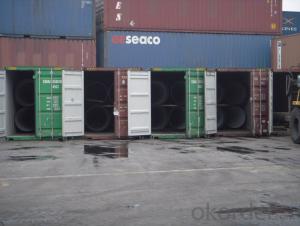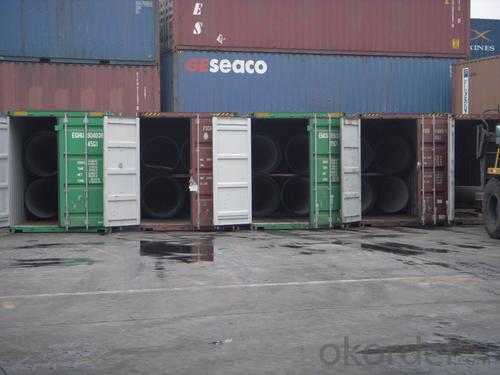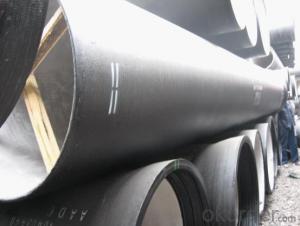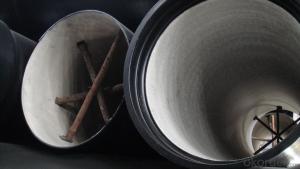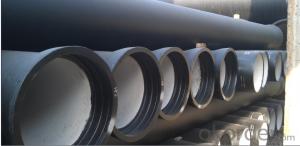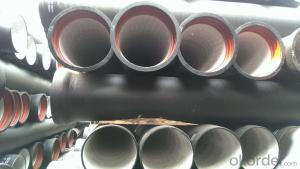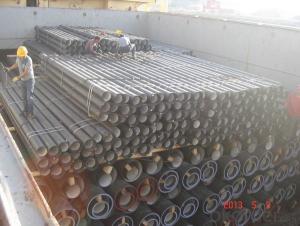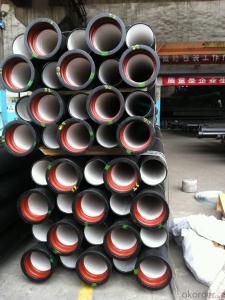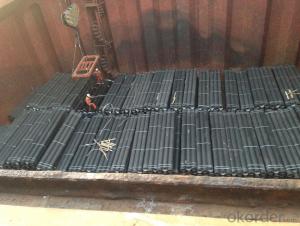DUCTILE IRON PIPE K7 DN 450 SOCKET SPIGOT PIPE
- Loading Port:
- Tianjin
- Payment Terms:
- TT OR LC
- Min Order Qty:
- 25 m.t.
- Supply Capability:
- 30000 m.t./month
OKorder Service Pledge
OKorder Financial Service
You Might Also Like
1) The standard of pipe: ISO2531:1998, EN545:2006,K9 K8
2) Effective length: 6m/5.7m
3) Inner cement line: Portland cement lineas per ISO4179
4) Zinc coating: at least 130g/m2 as per ISO8179
5) Bitumen painting: at least 70μm as per ISO8179
6)With 102% quantity of NBR, SBR, or EPDM ring asper ISO4633
7) DN80-DN1200
8) Highstrength, lighter than grey iron, good corrosion resistance, no furring, smallflow resistance, easy fixing, long life tome about 100 yeas
9)Checked by automatic inspection equipment
10) Composition:
Chemical composition | |||
Chemical composition | Ductile Cast Iron Pipe (%) | Grey iron pipe (%) | Steel pipe (%) |
C | 3.5-4.0 | 3.2-3.8 | 0.1-0.2 |
Si | 1.9-2.6 | 1.4-2.2 | 0.15-0.4 |
Mn | 0.15-0.45 | 0.4-0.6 | 0.3-0.6 |
P | ≤0.06 | ≤0.3 | 0.02-0.03 |
S | ≤0.02 | ≤0.1 | 0.02-0.03 |
Mg | 0.03-0.06 |
|
|
11) Feature:
Mechanical properties | |||
| Ductile Cast Iron Pipe | Grey Iron Pipe | Steel Pipe |
Tensile Strength(Mpa) | ≥420 | 150-260 | ≥400 |
Yield Strength(Mpa) | ≥300 | No Confirmation | No Confirmation |
Bending Strength(Mpa) | ≥590 | 200-360 | ≥400 |
Elongation (%) | ≥10 | Neglected | ≥18 |
Brinell Hardness(HBS) | ≤230 | ≤230 | About 140 |
12) T type mechanical joint
13) Packing: in bulk or container
PACKING: 1) Pipesare bundled together with the steel belt.
2) Wooden pieces are put between the pipes.
- Q: It's not easy to drill ductile iron with cobalt high speed steel bit. Please help to point it out
- The material can be annealed and the process is simple, that is, heating the workpiece and cooling it naturally. In this way, the hardness of the workpiece can be reduced.
- Q: Can ductile iron pipe be used for water supply to remote areas?
- Yes, ductile iron pipe can be used for water supply to remote areas. Ductile iron pipes have excellent strength and durability, making them suitable for long-distance water transmission. They can withstand high pressure and are resistant to external loads and impacts, making them ideal for rugged terrains and remote areas where maintenance and repairs can be challenging. Additionally, ductile iron pipes have a protective lining that prevents corrosion and ensures the water remains safe for consumption. Therefore, ductile iron pipes are an efficient and reliable choice for water supply to remote areas.
- Q: How does ductile iron pipe resist internal corrosion?
- Ductile iron pipe resists internal corrosion due to the protective barrier formed by its cement lining. This lining acts as a barrier between the iron pipe and the transported fluid, preventing direct contact and minimizing the chances of corrosion. Additionally, the high carbon content in ductile iron enhances its corrosion resistance compared to other types of iron pipes.
- Q: What's the function of the cement mortar lining of ductile iron pipes?
- Active protection is superior to barrier coating, cement mortar lining, and a stable hydroxide film formed on the surface of ductile iron and steel pipe to form a protective layer. This kind of protective coating has excellent antiseptic properties because they spontaneously protect themselves even in discontinuous linings. A polymer in sharp contrast, such as an epoxy lining, is also barrier coating, but only if 100% is applied without leakage. Any interruption or leakage will cause corrosion.It has been documented that cement mortar and cement mortar have been applied to the field of water transportation and can meet the water quality standards for a long time. Some standards still apply to the world. Cement mortar does not support microbial growth. In the case of corrosive water or low flow rate (prolonged stagnation), it is better to use cement mortar lined pipes because it can maintain high pH values in the pipe. This does not cause health problems and can be prevented by very simple sealed coating methods. The natural characteristics of the sealing coating provide the best protection for the inner wall of the pipe, while ensuring that all the water quality indexes meet the quality requirements, low cost and high efficiency.
- Q: Can ductile iron pipes be used for water supply in buildings?
- Ductile iron pipes are indeed a viable option for water supply in buildings. Renowned for their strength, durability, and resistance to corrosion, these pipes are well-suited for a wide range of uses, including water supply systems. With their impressive tensile strength, they can endure high-pressure conditions, making them perfect for delivering water to buildings. Furthermore, ductile iron pipes boast a lengthy lifespan, minimizing the necessity for frequent replacements. They also display excellent flow properties, facilitating efficient water distribution within structures. Consequently, ductile iron pipes are a dependable and frequently selected choice for water supply systems in buildings.
- Q: Can ductile iron pipes be used in contaminated soil conditions?
- Yes, ductile iron pipes can be used in contaminated soil conditions. Ductile iron is known for its strength and durability, making it resistant to corrosion and damage from external factors such as soil contaminants. Additionally, ductile iron pipes have been successfully used in a variety of challenging environments, including contaminated soils, where they can provide reliable and long-lasting underground infrastructure for the transportation of water and other fluids.
- Q: Ductile iron pipes lined with cement mortar in the water (living water, water in the 6.9-7.3) in the early pH, why pH increased? How to solve this problem?
- The basic characteristic of ductile iron pipe of ordinary cement mortar lining the inner wall of the tube will make passivation, have antiseptic effect, but in the initial stage of using cement mortar lining will be the alkali component separation, so that the pH value of water increased to influence water quality
- Q: Are ductile iron pipes suitable for use in sewage pumping stations?
- Yes, ductile iron pipes are suitable for use in sewage pumping stations. Ductile iron pipes are known for their durability, strength, and excellent corrosion resistance, making them an ideal choice for wastewater applications. They can withstand the high pressures and abrasive characteristics of sewage systems without any significant degradation or loss of performance over time. Additionally, ductile iron pipes have a smooth interior surface, which helps to minimize friction losses and prevent blockages. Furthermore, ductile iron pipes have a long lifespan and require minimal maintenance, reducing overall operating costs. Therefore, due to their various advantageous properties, ductile iron pipes are highly suitable for use in sewage pumping stations.
- Q: How much is the installation fee of the 400 largest ductile iron pipe?
- Compared with the PE pipe, from the installation time, ductile pipe PE pipe installation is simple and rapid, and after the installation of internal and external pressure bearing better tightness and corrosion resistance; from the point of view, ductile pipe sealing better after installation, but also can improve the corrosion resistance through various anti-corrosion methods;
- Q: How long do ductile iron pipes last?
- Ductile iron pipes possess an impressive durability and extended lifespan. Typically, these pipes can endure from 80 to 100 years, with certain instances even reaching an impressive 150 years. The exceptional longevity of ductile iron pipes can be attributed to their sturdy construction, enabling them to withstand high-pressure surroundings, combat corrosion, and endure severe weather conditions. Furthermore, ductile iron pipes have established a commendable reputation for their reliability and performance, rendering them a favored option for water and wastewater infrastructure projects worldwide. By conducting regular inspections and implementing maintenance measures, the lifespan of ductile iron pipes can be further prolonged, assuring their continued service for numerous decades to come.
Send your message to us
DUCTILE IRON PIPE K7 DN 450 SOCKET SPIGOT PIPE
- Loading Port:
- Tianjin
- Payment Terms:
- TT OR LC
- Min Order Qty:
- 25 m.t.
- Supply Capability:
- 30000 m.t./month
OKorder Service Pledge
OKorder Financial Service
Similar products
Hot products
Hot Searches
Related keywords
